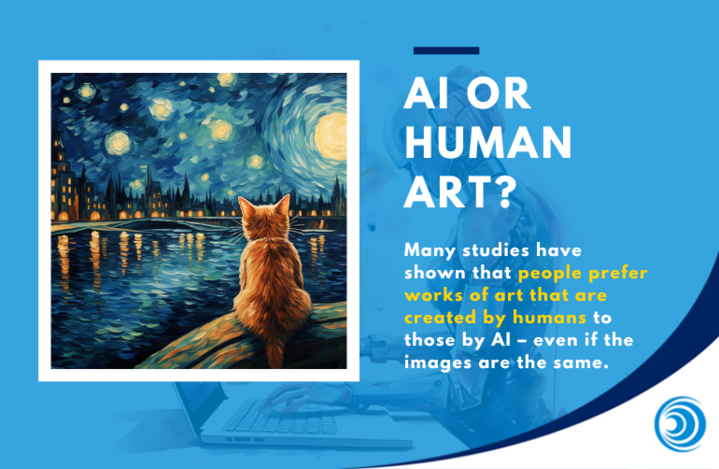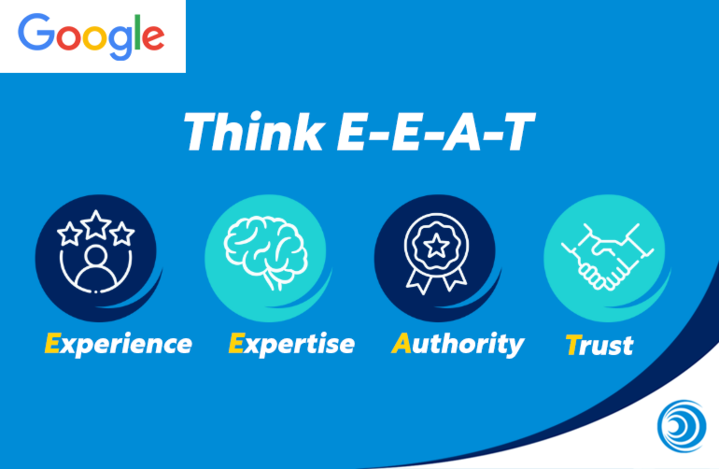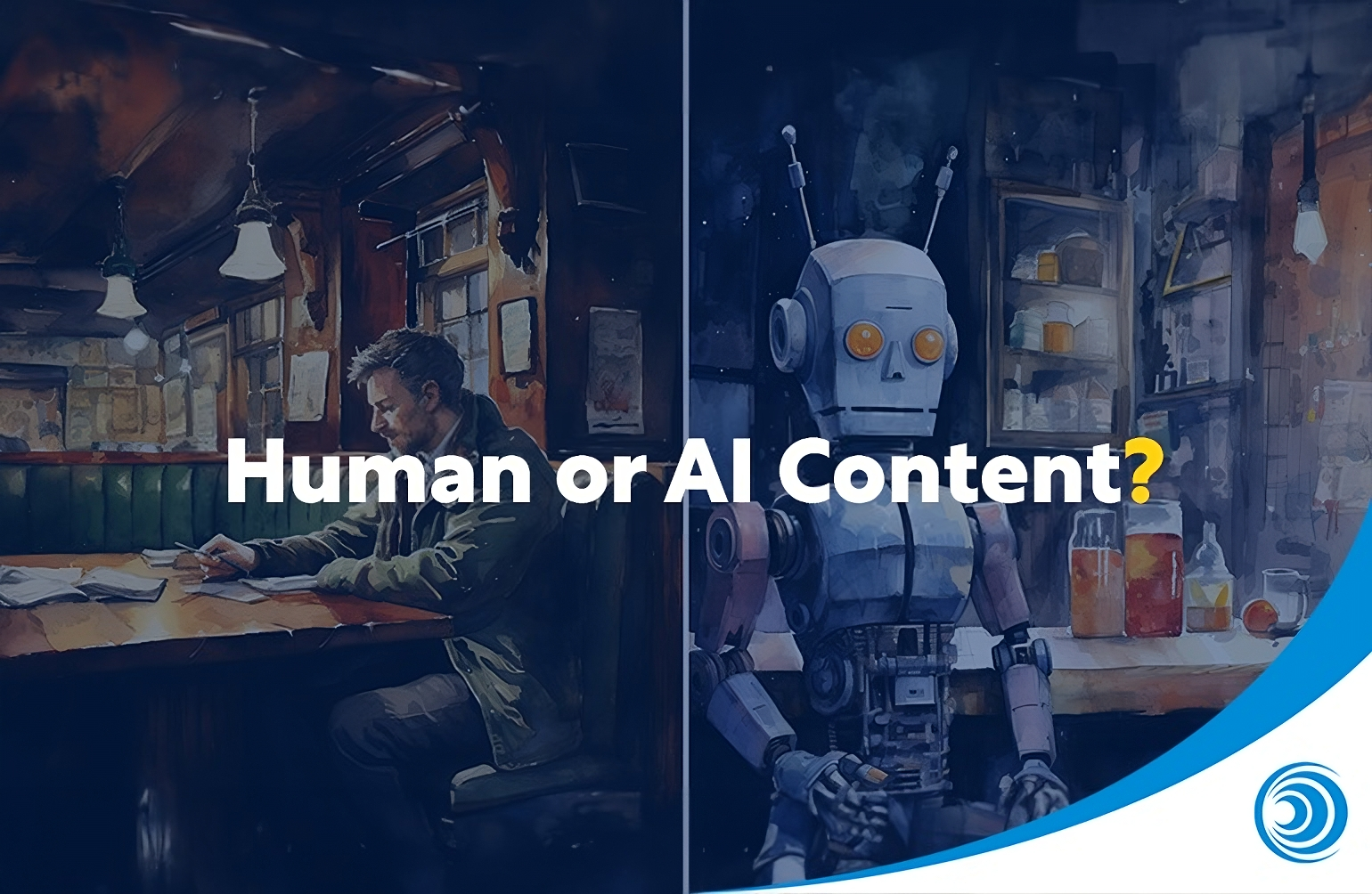- AI Visibility: How Brands Get Surfaced in Large Language Models - January 9, 2026
- Best Fintech Marketing Campaigns - November 3, 2025
- 5 Fintech Copywriting Tips That Actually Work - November 3, 2025
Back in 1953, Roald Dahl wrote a story called, ‘The Great Automatic Grammatizator’. It was about a computer that was better able to write than humans. In his story, over half of all the novels and stories published in the English language were written by this computer. Writers faced a harsh choice – either license their names to the machine’s owners or starve. Pretty bleak.
Glance at your LinkedIn feed and some marketers today are sharing similar fears of artificial intelligence (AI) taking their jobs and changing everything we know about current marketing practices. It’s even raising questions about what it means to be human.
Some marketers are rushing to embrace AI while others are thinking seriously about its longer-term implications for marketing – especially digital content and SEO.
In this blog, we will help filter out the fact from science fiction. We share what we know so far about AI generated content, its implications for your content and what it’s likely to do to your ranking in Google’s eyes.
What is AI generated content?
AI generated content is any content produced by artificial intelligence, including text, images, videos, audio, and more.
When ChatGPT was launched in November 2022, it reached 100 million monthly users in two months. In November 2023, this figure had rocketed to 100 million weekly active users.
AI tools like ChatGPT use human ‘prompts’ to scan the internet and convert information into content within moments. However, it has been limited to data sets that end in September 2021.
Over time, content marketers and writers can learn to craft useful, efficient, and increasingly complex prompts. Creating these is often referred to as prompt engineering. The content quality of AI tools is only as good as their input and good prompt engineering takes time to learn.
Naughty AI and brand damage
Some companies jumped in with both feet to take advantage of AI generated content for marketing – and have come unstuck.
For example, Sports Illustrated used it to try and improve its affiliate sale revenue. It created fake author pages that were rotated every couple of months by new fake authors. Each would have new fake bios and fake pictures.
These fake writers would then “write” content (AI gnerated) including affiliate links that earn the money for the publishers when sales were generated via the articles.
Sports Illustrated denied they were responsible and blamed the underhand practice on an external partner – but the brand and trust in it was damaged.
Original vs AI generated art
One of the most emotive and sensitive aspects of AI generated content is the question it poses about the value of human creativity.
Philosopher R. G. Collingwood highlighted that there is an important distinction between craft and art.
Craft involves delivering a known end-result that reveals the competency and skill of its creator. Art, on the other hand, is more open-ended with a less well-defined output.
Viewers of art will usually evaluate and appreciate the work based on their interpretation of the creator’s motivations and psychology behind its creation. AI creations, on the other hand, are bereft of such meaning.

Studies have found that people prefer original art over identical copies because their sense of human engagement in original works positively impacts their view of them. In that way, the viewer connects emotionally with the work.
In marketing, brands will often strive to elevate themselves above what Steve Jobs used to call ‘speeds and feeds’ – these are the technical, tangible features of a product. But the real goal is to instil your brand with meaning and value over and above its functionality and price.
Brands can be seen as a ‘persona’, and it would be reasonable to apply the above-mentioned studies and assume that people will warm more readily to human generated content and attributes. That way, it is more likely that prospective buyers will develop closer and more trusting relationships with your brand. This is still assuming that we are dealing with humans in the buying process, at least for the immediate future.
The impact of AI created content on SEO and Google results
This is a very hot topic for marketers.
More and more marketers are using AI generated content in the hope that it will achieve higher search engine rankings. The appeal of such an approach may be strong, especially for less experienced marketers, and the barrier to entry is lower than ever.
But this means there is both more competition and more low-quality, generic content than ever before. This is not something Google wants or will reward. They have produce search quality guidelines outlining this.
Google quality rater guidelines
Google has explicitly stated in its quality rater guidelines that, regardless of whether AI plays a role in content creation, its search algorithm still focuses on ranking high-quality and helpful content for users.

It has stated that, ‘Google’s ranking systems aim to reward original, high-quality content that demonstrates qualities of what we call E-E-A-T: expertise, experience, authoritativeness, and trustworthiness.’ Every element of EEAT is difficult to fake with AI. For example, AI cannot generate content from its own experience.
But humans can write content from these perspectives. Similarly, these are the areas in which we believe brands will want to differentiate themselves in coming years.
Google is telling us that replacing human writers with AI risks your site’s reputation being punished with less (or no) traffic.
So, here’s the big opportunity for marketers.
Focus on showcasing the experience of your organisation on a specific topic. Use what is truly unique to your business – your expertise and experience. AI can’t help you here – this can only come from your people. Focus on harnessing this internally and how to communicate this externally. Let your human expertise drive your content strategy and showcase what you know. Look for where you can offer a unique perspective that will define your business in the market.
Follow this strategy and we predict you will be rewarded with higher rankings as well as a more differentiated brand.
AI controversy and ethics
Recently, a company hired an SEO specialist who claimed to be able to achieve a major leap in their SEO performance. The consultant used AI to create a map of a competitor’s site and generated content that replicated their strategy.
The consultant then bragged on Twitter about how they used AI to ‘steal’ competitor rankings. Some viewed it as an accelerated SEO strategy. Others criticised it for being unethical to directly steal from a competitors’ website and serve up unoriginal, regurgitated content to users.

So, what happened? The apparent huge initial gains in traffic soon disappeared.
Pure AI generated content may only achieve short-term success before it is penalised by Google for the reasons described earlier. Quite simply, high-quality, insightful, and helpful content is the only sure route to long-term success for the foreseeable future.
Risks of AI-generated content
Google is not a fan of spam so using AI to generate such content can harm your SEO rankings. It can also damage your brand’s reputation in the eyes of users.
Most users will find it easy to identify spammy content as it is often unnatural or robotic in style. Readers are likely to quickly leave your page resulting in poor conversion rates of readers into customers.
Poor use of AI is likely to decrease page quaility, increase your site’s bounce rate (percentage of users leaving your website) or decrease engagement. Any of these negative user metrics will signal to Google that your content is not meeting user intent and isn’t helpful.
Sophisticated and powerful brands will be identifiable by distinctive elements such as humour, tone of voice and interesting asides, that only a human is likely to (currently) include.
Businesses should also be highly cautious of potential copyright infringement, as AI algorithms may produce content that plagiarises existing material.
AI and your future marketing team
If used wisely and appropriately, AI tools can streamline the process of content planning and creation, which can potentially save a lot of time and resources. It also helps scale your ability to produce content significantly and focus on the creative elements more closely.
Developing prompt engineering skills is likely to be useful in your team.
Tips and cautions for content production
For video and image creation, AI tools can save time on manual processes and editing. But where you can make savings on those aspects, you must devote more human thinking time to making the content distinctive and insightful. Put your expertise front and centre, as discussed earlier.
There is very strong evidence to indicate that Google penalises content generated solely for SEO without genuine value. Unsophisticated use of AI tools is very likely to produce inaccurate content and incur penalties from search engines.
Generative AI text tools like ChatGPT may repeat content from other sites so use online plagiarism-checker tools such as Grammarly. The best practice is to check on multiple plagiarism detectors for accuracy.
If you are going to try using AI for brand copywriting, you should establish clear editorial guidelines for copy consistency. Setting strict standards and incorporating them into AI prompts will help ensures your content aligns with quality expectations.
Also, AI tools cannot be currently relied on to spot anomalies that would not sit well with human readers. You may well still need designers to replace or edit unnatural or uninspiring AI-generated images. For instance, AI images always need to be checked for flaws such as six fingers on human hands, or floating objects, etc. It happens more often than you think.
So, for the foreseeable future, we strongly urge marketers to use AI sparingly.
As a marketing agency, we always look for new ways to increase the impact of the marketing campaigns we produce for clients. We will therefore always cautiously experiment with new tools that can help us achieve that objective while keeping a close eye on guidance (and the actions) of Google. Make sure you follow our social channels to keep informed about what we learn.
Closing thoughts
Let’s cast our minds back to where we started this blog – with our Roald Dahl story. At the end, the writer agonises over whether to sign his contract and license his name to the machine’s owners – or starve. ‘Give us strength, Oh Lord, to let our children starve,’ he bemoans.
We don’t need to worry about that kind of thing just yet.
So let’s enjoy this time we have, while humans are still in control. Our advice is this: don’t screw up your marketing with AI as we can’t send Arnold Schwarzenegger back in time to sort things out for you. Not yet.
